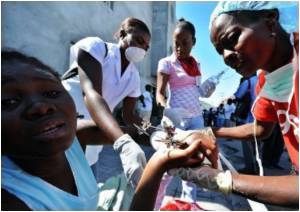Cholera deaths in Haiti went above 250, but new infections and fatalities seem to be slowing down, which indicates the epidemic has been brought under control.

The disease "is limited to a well-defined perimeter" in the northern region of Artibonite and part of the central plateau, Foreign Minister Marie-Michele Rey told reporters.
Speaking in Switzerland where she was attending a summit of French-speaking nations, Rey said that for the time being "those who are on the spot appear to be able to contain the situation."
But fears linger of a major health crisis should the outbreak infiltrate Port-au-Prince's squalid tent cities, where hundreds of thousands live in awful conditions after being displaced by January's earthquake.
Cholera is primarily passed on through contaminated water or food and could spread like wildfire through the unsanitary tent cities, where displaced families bathe outside, do laundry and share meals in close quarters.
Only five people in the capital have been diagnosed with cholera so far and the UN's Office for the Coordination of Humanitarian Affairs said they had all traveled in from the epicenter of the outbreak in the Artibonite river area.
Advertisement
Contamination of the Artibonite river, an artery crossing Haiti's rural center that thousands of people use for much of their daily activities, is believed to be the source of the epidemic.
Advertisement
"We cannot continue to treat cholera in this structure where we are also seeing other kinds of patients," Louissaint said. "We need to establish specific treatment centers."
Around 3,000 people have been admitted to hospitals and health centers near Saint-Marc, a main town several hours northwest of the capital.
More than 50 inmates at a prison in the center of the country have also been infected and three have died, officials said.
"The situation is under control. The population should not give in to panic, but people must take hygienic measures seriously," advised Jocelyne Pierre-Louis, a physician with the health ministry.
President Rene Preval and Health Minister Alex Larsen toured regions affected by the epidemic on Saturday, as authorities vowed they were working to provide clean water to residents.
On Friday, the health ministry asked the United Nations operations in Haiti to take charge of distributing medication sent by international donors.
Doctors Without Borders was setting up a field hospital in Saint Marc to treat patients and Oxfam sent five emergency specialists to Artibonite to set up water, sanitation and hygiene facilities for up to 100,000 people.
The Canadian government has offered to set up a military hospital on the ground and the United States has pledged to set up large tents to treat patients.
Canada, which has its own sizable Haitian population, also offered to send one million Canadian dollars to help fight the spread of the outbreak.
"Canada is worried about the risk that this serious disease spreads to other communities," Canadian Prime Minister Stephen Harper said.
The US branch of the Red Cross said Saturday that three large shipments of supplies had arrived on Haiti, already considered the poorest country in the western hemisphere even before January's 7.0-magnitude quake.
Large parts of the capital Port-au-Prince and other nearby towns were flattened, a quarter of a million people lost their lives and even more were displaced after losing their homes.
But up until this week, Haiti had at least been spared a major disease outbreak and aid workers are now desperately trying to keep the cholera at bay before it causes a second disaster for the nation in just 10 months.
Further bad news for Haiti, US scientists reported that the January 12 earthquake had failed to release all the tension in a notorious seismic fault, leaving its capital exposed to the risk of another seismic disaster.
Source-AFP










